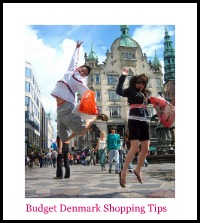

Getting Started in DenmarkGetting started in Denmark can be easy or it can be a case of learning by trial and error. For every expat moving to a new country, the question of what steps to take is always foremost in their minds. And when you realize you forgot to do something, you rush to get it taken care of and hope that it can be resolved quickly.Unfortunately, doing the wrong thing or taking too long to do something else can cause you heartache, cost you time and money and, more importantly, sometimes prevent you from staying in your new home. Getting started in Denmark is just a matter of taking the appropriate steps. Every expat should follow the 10 steps below to avoid a lot of needless aggravation. This is not to say you won't have problems and suffer some aggravation, but it will be much less if you do these things. Remember, other expats have done these same things when they were getting started in Denmark and they are now comfortably living and enjoying their lives. You can too! Tip: If you skip some of these steps, you will find it much harder to complete some of the others.
Follow the simple steps below � complete each one before going to the next one. If something does not apply, like schooling, just move on to the next step. Each step has a link to a page that gives you more details and information about that step. This is assuming that you have already decided to move and know where you are going to live and work. If you haven't, check out housing and employment for ideas and tips.
Poker.dk Poker.dk er stedet for succesfuldt poker. 10 Steps for the Expat1. First step in getting started in Denmark is to get permission to move to and work in Denmark. If you do not have permission to reside/work in Denmark before you arrive, you can be waiting months for approval and be unable to earn an income. Stay at home, keep earning money and then move when you get your approval. See documents for more details.2. When you get your residence/work permit, your next getting started step is a stop at the Folkeregister in the kommune which you are moving to. At the Folkeregister, you will apply for your CPR Number. Remember, you can't get a CPR number without having a residence permit. The above step will open so many doors, when your CPR card arrives. Makes life alot easier. 3. So the next step in getting started in Denmark is to take your CPR card to the bank. When you get your CPR card, you can open a bank account and do so many other things which are all based on your CPR number; e.g., apply for a Dankort and also set up a NEM Konto. Check out Banking in Denmark P.S. It is possible to open a bank account without a CPR number, but it is difficult and fewer and fewer banks are willing to do it. 4. Next getting started step is to stop in at the tax office to apply for a tax card. You will get two cards � an A kort and a B kort. Learn more about your tax card at skattecentre. 5. Step five is to check in with your kommune and register for Danish language classes. They will either enroll you, put your name on a waiting list or give you a list of schools and let you contact them and make your own arrangements. Find your local kommune and learn more about the Danish language here. We are both with Det Faglige Hus, which is one of the least expensive in Denmark and have found them very helpful, especially when I was off work for 3 months due to back surgery. They took care of everything. The offer below is for 3 free months. Full rate is 515 per month, but it is tax deductible, so the price you pay is only 346 kroner. Not bad for unemployment insurance. You can also opt for just A-Kasse without the union help for 446 per month (about 300 after tax). Anyone that gets a salary can apply.

10. Now for the most fun and important getting started in Denmark tip that I can impart to new expats. Familiarize yourself with the area you are living in. Take lots of walks, visit as many stores as possible, locate the post office, bank, drug store, library -- explore, explore and explore some more. The more you know of the area in which you live, the quicker you will begin to feel at home. Exploring the FYI Denmark website will also give you lots of information on things like shopping, transportation, housing and much more information to help you acclimate quickly. See our list below for additional helpful advice. I hope that you take these 10 getting started in Denmark steps to heart and do them all. There is much more to do and learn, but at least you will have gotten some of the important things out of the way and not have to worry about them. Worry about figuring out to read the bus schedules bus schedules instead! :) Check out the other tips below and if you did not see what you are looking for on FYIDenmark.com, use the google site search tool. to search the whole site. There are hundreds of pages of insightful information to help you getting started in Denmark and settling in quickly. Further tips on things you should do:
There are many other things that you will need to learn as you adapt to getting started in Denmark, like: 1. Mastering the transportation system: Trains, buses, metro, bicycling, cars, airlines, airports 2. Setting up your television license and learning about the Danish system. 3. Choosing a telephone company and knowing who are the companies vying for your business. 4. What to bring with you and more importantly what not to bring! 5. Knowing where you should shop for food and clothes, including shopping list with Danish names. Helpful ..yea? 6. Maybe you need some more moving advice and relocation tips. 7. Learning more about what newspapers and radio stations are available and their costs. 8. And maybe you need help coping with culture shock and finding expat friends. 9. What about bringing your pet(s) or your car with you. What are the rules and costs. 9. And what about all the things the Danes know and take for granted like understanding Danish Money,etiquette, the health care system and even things as simple as the calendar and time, which are different.
Little steps are better than large leaps when it comes to settling in comfortably. One day you will look back at it and it will all be done. Others have and so can YOU! If this is all too much, leave getting started in Denmark and learn some general information about your new home. Welcome and good luck.
Please feel free to comment on this subjectDo you have a helpful tip or comment on this subject that you would like to share? Please leave comments below. |
Try this new FREE auction site for Denmark! No fees.





























